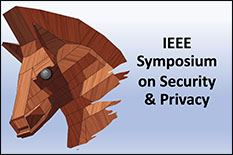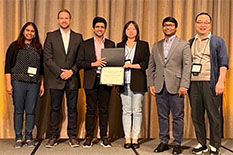News Story
Srivastava, Qu Participate in Kick-Off for MURI Award
Published March 13, 2015
Two Maryland Cybersecurity Center (MC2) faculty members took part in a March 17 kick-off for a $7.5 million Department of Defense grant to support research that will analyze and upgrade security protections for nanoscale computer hardware.
The five-year multidisciplinary university research initiative (MURI) grant was awarded in May through the Air Force Office of Scientific Research (AFOSR) to 10 researchers at UMD, Rice University and the University of Connecticut, who will host the kick-off event.
Ankur Srivastava, a professor in the Department of Electrical and Computer Engineering (ECE) and the Institute of Systems Research (ISR), and Gang Qu, a professor in ECE and ISR, will represent UMD. Both researchers are part of MC2, one of 16 centers and labs in the University of Maryland Institute for Advanced Computer Studies (UMIACS).
“There’s a lot of energy and excitement surrounding this project, and we can’t wait to officially get started."
Ankur Srivastava
Their contributions to the MURI project will leverage their expertise in hardware security, digital watermarking and fingerprinting for VLSI design, circuit obfuscation, design and implementation of physical unclonable functions, and 3-D integrated-circuit integration.
Nanoscale devices, many thousands of times smaller than the width of a human hair, are increasingly popular in the microelectronics industry and are performing vital functions supporting national security, commerce, energy and transportation. Nanoscale chips are used in many applications, from air traffic control computers to medical devices to personal cell phones and the nation’s electric grid and banking system.
“There’s a lot of energy and excitement surrounding this project, and we can’t wait to officially get started,” says Srivastava. “Nanoscale devices pose both opportunities and challenges. Characterizing and modeling these devices, along with gaining an understanding of likely attacks and developing security properties to foil them, will enable us to create the kinds of devices that will meet the critical needs of the Department of Defense and, hopefully, have a real impact.”









